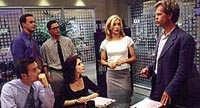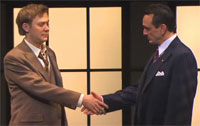 That quote - "You guys know who Philo Farnsworth was?" - was the way William H. Macy, playing a ratings expert on the ABC comedy Sports Night, began lecturing a trio of meddling network executives on the true inventor of electronic television. That speech, and that episode, was written by Sports Night creator Aaron Sorkin in 1999.
That quote - "You guys know who Philo Farnsworth was?" - was the way William H. Macy, playing a ratings expert on the ABC comedy Sports Night, began lecturing a trio of meddling network executives on the true inventor of electronic television. That speech, and that episode, was written by Sports Night creator Aaron Sorkin in 1999.
Tonight, eight years later, Sorkin's new play, The Farnsworth Invention, opens on Broadway. (Finally, after being delayed by the Local One stagehands strike.)
"He invented television," Macy's TV consultant explained. "I don't mean he invented television like Uncle Miltie. I mean, he invented the television, in a little house in Provo, Utah - at a time when the idea of transmitting moving pictures through the air would be like me saying I had figured out a way to beam us aboard the starship Enterprise.
"He was a visionary. He died broke, and without fanfare. The guy I really like, though, was his brother-in-law, Cliff Gardner. He said, 'Philo, I know everyone thinks you're crazy, but I want to be a part of this. I don't have your head for science, so I'm not going to be able to help much with the design and the mechanics of the invention. But it sounds like you're gonna need glass tubes.'"
Sorkin, though Macy's character, went on to say that Cliff offered to learn how to be a glass blower, so he could be part of the team inventing this exciting new dream Farnsworth called television. And tonight, working with a team of onstage and backstage talent, Sorkin revives Cliff and Philo, and that exciting dream, in a play that ought to earn very positive reviews.
Here's one of them.

The Farnsworth Invention tells two stories at once, each with its own protagonist, point of view and narrator. Jimmi Simpson plays Farnsworth, an inventive farm boy whose idea for breaking broadcast images into separate scan lines came from the parallel patterns his tri-bladed plow made when furrowing the fields. Hank Azaria plays David Sarnoff, whose stratospheric rise through the nascent medium of radio led to him being founder of NBC and president of RCA. When he heard about television, he was determined to control it, and its patents and royalties, just as aggressively.
Sorkin's master stroke, in the construction of the play, is to have Sarnoff narrate and comment upon Farnsworth's story, and vice versa. This allows each man to give credit where it's due, but also to sprinkle seeds of doubt.
Sarnoff's claims of being the exclusive wireless telegraph operator relaying news of the survivors of the Titanic, long questioned by historians, are ridiculed by Farnsworth himself in Sorkin's telling. Conversely, when the brilliant young inventor Farnsworth is encouraged, in the play, to retire to a different room and relax by playing one of the musical instruments there, the sound of beautiful music draws laughs from the studio audience, but a scowl from Sarnoff.
"Yeah," Sarnoff says sarcastically. "Turns out 'Astro Boy' was also a concert-level violinist." (That turns out to be true.)
There are lots of laughs in Farnsworth Invention. The very biggest is saved for last, delivered expertly by Azaria, and is wholly apocryphal. So is a more dramatic scene, as utterly without basis in fact as a key scene in Nixon/Frost - but, in the case of The Farnsworth Invention, labeled as such immediately after it's over.
Dramatic license is taken in other regards, but nothing major, and Sorkin gets the key details just right. Even the things that sound most preposterous - a 14-year-old Farnsworth winning a contest to invent the first ignition lock for an automobile, or sketching his basic concept for television to an incredulous ninth-grade science teacher - actually happened.

Director Des McAnuff keeps things moving almost as swiftly as a West Wing walk-and-talk. The supporting actors, all paying multiple roles, sometimes literally run through the decades, covering everything from the crash of the Titanic to the crash of the stock market.
Sarnoff is the best role of Azaria's career to date, and, as for Simpson, his tender portrayal of Farnsworth could well make him a star. Handling all the exposition and techno-babble is tricky enough. Making both men likable, especially when Farnsworth is the clear hero of the piece, is even trickier, and both leads perform that task superbly.
Fewer than 10 city blocks where the real Sarnoff set up shop at Rockefeller Center and Radio City, Sorkin's The Farnsworth Invention, at the Music Box, tells the story of television's inventor in a way that is itself fittingly inventive. At a time when television writers are on strike, one of this generation's best TV writers has a dynamic new work you can, and should, enjoy.
It's about television - but it's on stage, and it opens tonight.